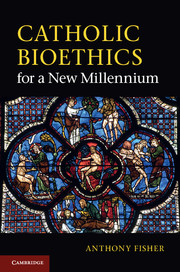Book contents
- Frontmatter
- Contents
- Foreword
- Abbreviations
- Introduction
- PART I How are we to do bioethics?
- PART II Beginning of life
- PART III Later life
- Chapter 7 Transplants: bodies, relationships and ethics
- Chapter 8 Artificial nutrition: why do unresponsive patients matter?
- Chapter 9 Endings: suicide and euthanasia in the Bible
- PART IV Protecting life
- Index
- References
Chapter 7 - Transplants: bodies, relationships and ethics
from PART III - Later life
Published online by Cambridge University Press: 05 June 2012
- Frontmatter
- Contents
- Foreword
- Abbreviations
- Introduction
- PART I How are we to do bioethics?
- PART II Beginning of life
- PART III Later life
- Chapter 7 Transplants: bodies, relationships and ethics
- Chapter 8 Artificial nutrition: why do unresponsive patients matter?
- Chapter 9 Endings: suicide and euthanasia in the Bible
- PART IV Protecting life
- Index
- References
Summary
Love beyond death
The French-Canadian film Jésus de Montréal is a secular retelling of the life-sharing death of Jesus and his ‘resurrection’ in the lives of other people. When the Jesus figure in this young people’s Passion play is killed, his bodily organs are harvested and so several people’s lives are saved. Pope John Paul II drew a similar parallel with respect to transplantation: ‘The progress of medical science has made it possible for people to project even beyond death their vocation to love. Analogously to Christ’s Paschal Mystery, in dying, death is somehow overcome and life restored.’
Transplantation is one of the real success stories of modern medicine and is rightly celebrated for the lives it has saved or improved. Progress in this area has been very rapid, and an ever-growing variety of individual major organs (and even multiple major organs), blood, bone and other tissues, cell lines and stem cells are being successfully transferred from one party to another. So successful is transplantation that demand for tissues far outstrips supply. New sources for tissues are therefore constantly being sought, and there are regular campaigns to encourage people to donate renewable tissues, such as blood or bone marrow, and to consent in advance to the use of their tissues after death for transplantation. Some jurisdictions now presume such consent unless there is evidence to the contrary, which has become a source of continuing bioethical and biolegal debate. In other jurisdictions there is little or no regulation in practice and a thriving trade in organs. The principal ‘donors’ are, of course, the poor, and sometimes the unwilling, especially from Asia and the Near East; the tissue recipients are the wealthy of all nations. Meanwhile research continues apace, with ‘xenotransplants’ or ‘heterografts’ – the transfer of valves, skin and other parts from animals to human beings – already taking place and much more proposed for the future. As we saw in Chapter 5, others hope to extract stem cells or other tissues, even from embryos and foetuses, possibly cloned as perfect genetic matches for the recipient.
- Type
- Chapter
- Information
- Catholic Bioethics for a New Millennium , pp. 185 - 212Publisher: Cambridge University PressPrint publication year: 2011



